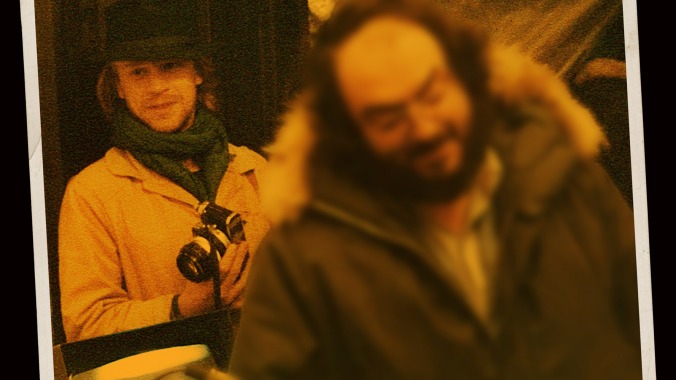Among the eccentric secondary characters of film history, few are as puzzling as Leon Vitali, the English actor who left behind his career to become a personal assistant of director Stanley Kubrick. Filmworker (as opposed to “filmmaker”), the title of Tony Zierra’s documentary about Vitali, was his preferred term for this peculiar calling. For more than 20 years, Vitali was Kubrick’s go-between, research assistant, talent scout. He coached Kubrick’s actors and took his notes. When Kubrick was preparing his Stephen King adaptation, The Shining, he sent Vitali on a trip around America to take pictures of hotel kitchens; when one of the director’s many cats got sick, it was up to Vitali to set up a closed-circuit TV system so Kubrick could keep watch from anywhere in his secluded mansion. And when the notoriously private filmmaker needed to fire off a strongly worded missive to studio executives or a film lab, he would sometimes sign it “Best, Leon Vitali,” leaving his assistant to field the apologetic follow-up call. But what does a person who has given over the best years of his life to being micro-managed by a perfectionist do when the master is gone?
Now in his 60s, with an affable ex-rock-star look, Vitali recounts in the film how he first entered Kubrick’s orbit as a modish young actor, when he landed a dream gig as the vindictive Lord Bullingdon in the director’s cynical and enigmatic 1975 costume drama Barry Lyndon. (That film’s star, Ryan O’Neal, is interviewed at length here.) Kubrick’s grueling attention to detail was already the stuff of movie legend. But, for whatever reason, he took a shine to Vitali’s curiosity about the filmmaking process, and remained in touch—a courtesy not extended to many of his leading actors, who formed what they believed to be close friendships with the director during production and then never heard from him again. In fact, he would have many close associates like Vitali (including his other personal assistant, Tony Frewin), and for anyone who has followed Kubrick’s legacy in the 19 years since his death, it’s clear that some posthumous behind-the-scenes drama has led to enmity in the director’s former inner circle. Kubrick—who by most accounts could be disarmingly cozy, genial, and generous when necessary—seemed to have had a knack for giving people the impression that he trusted them more than anyone else.
Filmworker stops just short of calling him manipulative; Vitali’s preferred term (he seems to have a few of these) is “playing chess.” After all, how well did he really know his boss? Smartly, Filmworker makes no claim to present a portrait of the “real” Kubrick, who remains an elusive figure in the film, playing with Vitali’s children (who have only fond memories of the director) in home videos while their father looks on haggardly in the background. Its subject really is Vitali. In many ways, he’s all over the Kubrick films he worked on: as a tireless coach for inexperienced cast members like Danny Lloyd and the late R. Lee Ermey; as a jack-of-all-trades who could take on any responsibility on a moment’s notice. (He played no less than eight different masked and robed orgy-goers in Kubrick’s last film, Eyes Wide Shut, all the while helping manage the director’s dailies.) And yet he’s nobody.
Matthew Modine—who wrote about Vitali repeatedly in his published diaries of the hellish production of Full Metal Jacket and is also interviewed in Filmworker—echoes what seems to be a common sentiment about Vitali: that the guy is a friendly mystery, either a glutton for punishment or a saint. It’s this fascination that makes Filmworker compelling, despite its modest and uneven means. (Ironically, the documentary seems to have been mostly a one-man production on Zierra’s part.) For the fans, it offers no shortage of Kubrickiana, from the technical (mostly related to the director’s relationship to actors) to the quirky (e.g., plans for a “cat compound”). Under its war stories, production tidbits, and close-ups of Howard Hughes-esque memoranda is the story of a life devoted to a contact high—of a man working exhaustingly long hours (and cleaning up a lot of cat hair) to vicariously experience the minutiae of the Kubrick vision. To his moviegoers, Kubrick’s name has long been a byword for demanding genius and director mystique. It seems it was the same for many of his collaborators. The only difference is that they had closer seats.

 Keep scrolling for more great stories.
Keep scrolling for more great stories.
